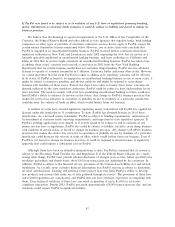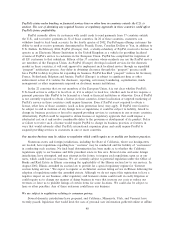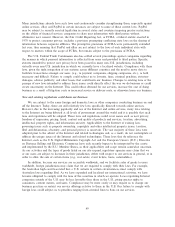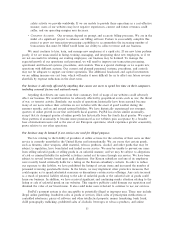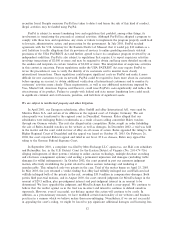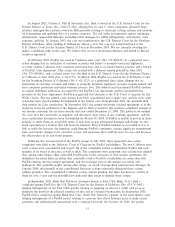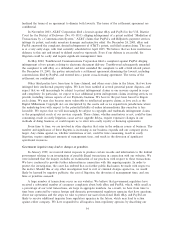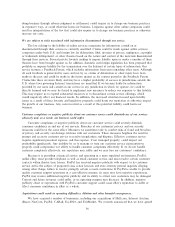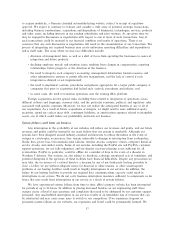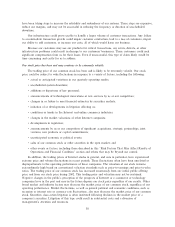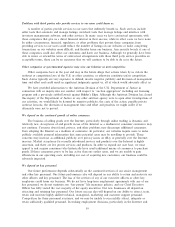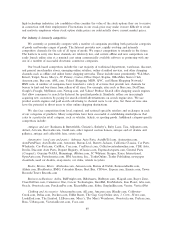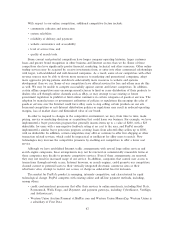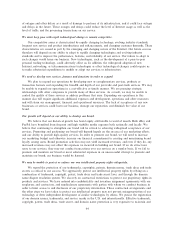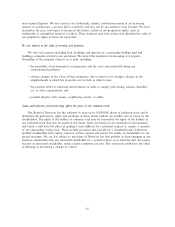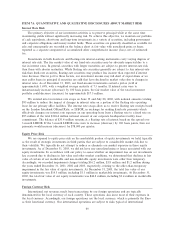eBay 2003 Annual Report Download - page 59
Download and view the complete annual report
Please find page 59 of the 2003 eBay annual report below. You can navigate through the pages in the report by either clicking on the pages listed below, or by using the keyword search tool below to find specific information within the annual report.to acquire mobile.de, a German classiÑed automobile-listing website, subject to receipt of regulatory
approval. We expect to continue to evaluate and consider a wide array of potential strategic transactions,
including business combinations, acquisitions and dispositions of businesses, technologies, services, products
and other assets, including interests in our existing subsidiaries and joint ventures. At any given time we
may be engaged in discussions or negotiations with respect to one or more of such transactions. Any of
such transactions could be material to our Ñnancial condition and results of operations. There is no
assurance that any such discussions or negotiations will result in the consummation of any transaction. The
process of integrating any acquired business may create unforeseen operating diÇculties and expenditures
and is itself risky. The areas where we may face diÇculties include:
‚ diversion of management time, as well as a shift of focus from operating the businesses to issues of
integration and future products;
‚ declining employee morale and retention issues resulting from changes in compensation, reporting
relationships, future prospects, or the direction of the business;
‚ the need to integrate each company's accounting, management information, human resource and
other administrative systems to permit eÅective management, and the lack of control if such
integration is delayed or not implemented;
‚ the need to implement controls, procedures and policies appropriate for a larger public company at
companies that prior to acquisition had lacked such controls, procedures and policies; and
‚ in some cases, the need to transition operations onto the existing eBay platform.
Foreign acquisitions involve special risks, including those related to integration of operations across
diÅerent cultures and languages, currency risks, and the particular economic, political, and regulatory risks
associated with speciÑc countries. Moreover, we may not realize the anticipated beneÑts of any or all of
our acquisitions. As a result of future acquisitions or mergers, we might need to issue additional equity
securities, spend our cash,or incur debt, contingent liabilities, or amortization expenses related to intangible
assets, any of which could reduce our proÑtability and harm our business.
System failures could harm our business.
Any interruption in the availability of our websites will reduce our revenues and proÑts, and our future
revenues and proÑts could be harmed if our users believe that our system is unreliable. Although our
systems have been designed around industry-standard architectures to reduce downtime in the event of
outages or catastrophic occurrences, they remain vulnerable to damage or interruption from earthquakes,
Öoods, Ñres, power loss, telecommunication failures, terrorist attacks, computer viruses, computer denial-of-
service attacks, and similar events. Some of our systems, including the PayPal site and PayPal's customer
support operations, are not fully redundant, and our disaster recovery planning is not suÇcient for all
eventualities. PayPal, in particular, could be oÉine for a number of days in the event of a disaster in
Northern California. Our systems are also subject to break-ins, sabotage, intentional acts of vandalism, and
potential disruption if the operators of these facilities have Ñnancial diÇculties. Despite any precautions we
may take, the occurrence of a natural disaster, a decision by any of our third-party hosting providers to
close a facility we use without adequate notice for Ñnancial or other reasons, or other unanticipated
problems at our hosting facilities could result in lengthy interruptions in our services. In addition, the
failure by our hosting facilities to provide our required data communications capacity could result in
interruptions in our service. We do not carry business interruption insurance suÇcient to compensate us for
losses that may result from interruptions in our service as a result of system failures.
We have experienced system failures from time to time. eBay's primary website has been interrupted
for periods of up to 22 hours. In addition to placing increased burdens on our engineering staÅ, these
outages create a Öood of user questions and complaints that need to be addressed by our customer support
personnel. Any unscheduled interruption in our services results in an immediate loss of revenues that can
be substantial and may cause some users to switch to our competitors. If we experience frequent or
persistent system failures on our websites, our reputation and brand could be permanently harmed. We
57


